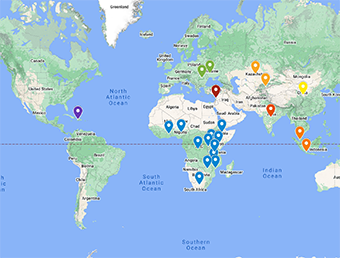

- Research Scientist in Biostatistics (Center for Methods in Implementation and Prevention Science), Yale School of Public Health
- Associate Director, Interdisciplinary Research Methods Core, CIRA
Biography:
Raul U. Hernandez-Ramirez is a Research Scientist in Biostatistics at the Center for Methods in Implementation and Prevention Science (CMIPS) and Associate Director of the Interdisciplinary Research Methods Core at the Center for Interdisciplinary Research on AIDS (CIRA). He is a member of the Yale Cancer Center (YCC) and of the Yale Institute for Global Health (YIGH). His research mainly focuses on HIV/AIDS, cancer, and implementation science (IS). He also conducts research to develop and apply causal inference methods for the evaluation of HIV prevention interventions and methods to account for exposure uncertainty in environmental health studies. He collaborates on research projects and grants in New Haven and other settings in the US, as well as in low- and middle-income countries, including Mexico and Uganda. He is interested in adapting/developing and applying interventions to increase the uptake of evidence-based interventions and practices for HIV and cancer prevention and care (e.g., follow up care for abnormal cervical cancer screens) and strategies to enable their implementation.
He provides expertise, consultations, and technical assistance on IS and research methods, design, and analysis to CIRA affiliates and projects in Ending the HIV Epidemic (EHE) priority areas through CIRA’s IRM core and the CIRA affiliated IS hub R3EDI (Rigorous, Rapid, & Relevant Evidence aDaptation & Implementation to EHE), respectively.
He completed a PhD in Public Health (Chronic Disease Epidemiology) at Yale and conducted part of his doctoral dissertation research as a predoctoral visiting fellow at the National Cancer Institute (NCI). He subsequently completed the Training Institute for Dissemination and Implementation Research in Cancer (TIDIRC) and the Multilevel Intervention Training Institute (MLTI) from NCI, as well as the training in optimization of multicomponent interventions using the Multiphase Optimization Strategy (MOST) by Dr. Linda Collins.
Before coming to Yale, he gained substantial research experience in nutrition, environment health, and cancer at the National Institute of Public Health of Mexico. He spent several years in Mexico working as a researcher and instructor and was the project coordinator, data manager, and main statistician for a multistate study. He previously obtained a MSc in Epidemiology and a BSc in Nutrition.


